#good omens god
Explore tagged Tumblr posts
Text
Angst War comic Chapter 2 p.9 to p.11
@goodomensafterdark
The other soldiers : @vavoom-sorted-art @gleafer @daneecastle @lauramoon1987 @kotias and all the people who participated to this adventure!!
God had a plan.. She called him Aziraphale
prev - next

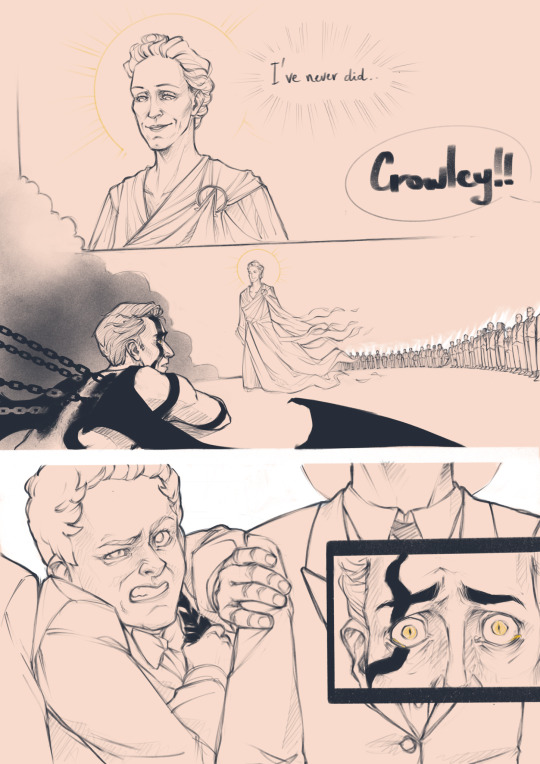
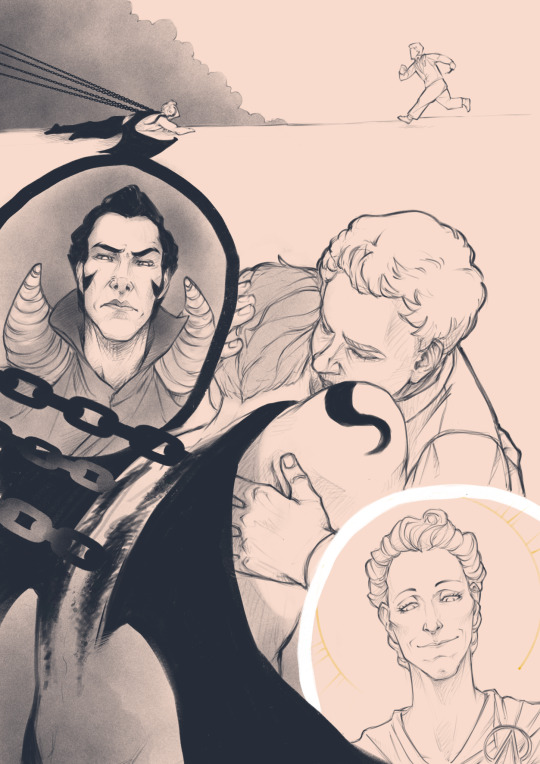
And a little soundtrack for this one
#good omens#good omens fanart#good omens 2#good omens fanwork#crowley#aziraphale#aziracrow#ineffable husbands#good omens comic#good omens after dark angst war#angst war#good omens god#good omens satan#good omens lucifer#Spotify
1K notes
·
View notes
Text
Hot take: Crowley and God share the same philosophy
Of all characters in Good Omens, Crowley is the one who criticizes God and his/her actions the most. And I find that kind of ironic regarding the fact that their take on free will and morality appears to be essentially the same.
The fandom appreciates Crowley for his own special way of doing evil. He does not try "to spread misery and panic among the humans" like Shax or manipulate people into sinning like Hastur and Ligur. Instead, he relies on humans' tendency for self-destruction. Crowley creates minor inconveniences, like by shutting down the mobile phone network. Inconveniences that could just be shrugged away, but in fact lead to people lashing out on each other. Or he gives individuals with evil deeds on their mind the opportunity to carry them out, like when he turns the paintball guns of the office staff into real ones.

And he is succesful with that. The series does not make it that explicit, but the book clearly mentions how Crowley is far more efficient at collectings souls for hell than demons like Hastur and Ligur. You could say that Crowley is simply doing what he is obliged to do. But his proud face when he tells Hastur and Ligur about the bit with the mobile phone network, when he talks about giving the office staff machine guns, or when he presents his design for the M25 in hell suggests that he is actually enjoying what he does.
Moreover, although Crowley does not do real evil, he still contributes to it, because, as Waller puts it, "[a] person is infinitely more likely to pull the trigger if they are handed a gun" (p. 23; cited below). Does this mean that Crowley is far more demonic than we admit? Not exactly; I think Crowley actually has high moral standards. He is completely opposed to letting innocents - like the kids during the Flood or Job, Job's children and even Job's goats - suffer.

But the thing with people with high moral standards (and I know this from myself) is: they can be pretty cruel to anyone who does not live up to these standards. Crowley firmly believes in "free will, including the right to murder". But in his opinion, that also means that you have to deal with the consequences of your actions. He does not seem to mind the paintball players being arrested for trying to shoot each other, nor does he seem to have a problem with people going to hell for their evil deeds.
To be fair, Crowley acknowledges that sometimes the circumstances force people to do bad things. That's why he saves Elspeth, since he does not want her to "be damned forever" for committing sins out of poverty and desparation.
But apart from that, he sees testing people's morality as his job. Again, this is not explicit in the series, but in the book he considers demons to "occup[y] the same position as tax inspectors" (Pratchett/Gaiman, p. 275; cited below) in the universe. And although he does not want innocents to suffer, that's exactly what happens as a result of him tempting people to do bad things, of giving them the opportunity to hurt others.
But if people pass the test, then that's fine for Crowley, too. We can witness this with Jesus. Yes, Crowley even tried to tempt the son of God by showing him all the kingdoms in the world. But Jesus resisted the temptation and Crowley did not seem upset about it. Actually, he seems to respect Jesus a lot for his good character. He possibly even suspected beforehand that Jesus would resist his temptation and saw it more as doing Jesus a favour, because "his travel opportunities are limited".
And although Crowley is convinced that people should deal with the consequences of their actions, he draws the line where said consequences become to harsh or irrevocable. He expresses this when talking to God in season 1: "I know you're testing them. You said you were going to be testing them. But you shouldn't test them to destruction". Crowley does not want to test people to destruction. That's why he made sure that nobody would actually get hurt or killed in the shooting (if you want to read even more about Crowley's moral philosophy, see this and this post by @linipikk and @ilarual).
What does this all have to do with God? Well, I believe God is doing pretty much what Crowley does: he/she is testing people - by setting up the plan for Armageddon, by allowing Satan to destroy Job's wordly goods and kill his children.

And I think the reason why God does this is quite obvious, if you think about it. Because if someone does good things just because God told them so or because they fear punishment if they don't, then that does not make them a good person, it just makes them an obedient one. To really judge the morality of a person, you need to give them the chance to do evil things. I think Aziraphale got this quite right: "They cannot be truly holy unless they also get the opportunity to be wicked".
Giving people the opportunity to be wicked is what Crowley does when he turns the paintball guns into real ones, and it's also what God does when he/she makes the Apocalypse part of "the Great Plan", thereby offering both heaven and hell a justification for their intent to wage war against each other. The same goes for him/her telling angels and demons alike that "Satan and his diabolical ministers may destroy everything Job owns, no questions asked", assuring them that they won't be punished for harming the poor man or not preventing him from being harmed.
By basically giving them free pass with everything they want to do, God creates an opportunity for people to really show whether they're moral persons or not. And like Crowley, who made sure that the paintball players would not die when shooting at each other, God left a backdoor for saving what is worth saving; he/she is not testing people to destruction. Adam has the power to destroy the world, but he does also have the freedom to reject it. Crowley and Aziraphale have the right to kill Job's children or let them be killed, but they also have the right to refuse to do so.
Nevertheless, God also lets everyone face the consequences - may they be good or bad - of what they did. Again, I find it ironic how much Crowley complains about the injustice of his fall, when it was just the logical result of him joining Lucifer's side. You can clearly see his double standard here - he is fine with the notion of actions having consequences when it comes to others, but not when it comes to himself (for more about Crowley struggling with unintended consequences, see this post).
But back to God: God does not only allow evil to happen (like Crowley does), he/she is also responsible for its existence in the first place. If God created everything, then he/she did also create evil. This does not have to mean that God wants evil to happen, but simply that it is necessary that evil exists so that people can make moral choices, just as Aziraphale explains.
Speaking of creation, there's one last possible parallel that I noticed between Crowley and God. The fandom often refers to Crowley as "The Starmaker". But Crowley didn't create stars, he created "a star factorer". And he seemed especially proud of the fact that it would allow the stars to develop on their own, while most stars would "come pre-aged". He did not determine how they should be, but provided them with everything they needed to grow and then simply wanted to watch them unfold before him.

My suspicion is that God did a very similar thing when he/she created humans (and angels, some of them who would become demons). He/she does barely talk to anybody and does not tell humans, angels and demons what to do. Instead, he/she provided them with everything they needed - including the ability to do both good and evil - and just watches what path they will take.
I think that God wants his/her creations to be free, truly free. That's why he/she made it so easy for Adam and Eve to eat from the Tree of Knowledge, something even Crowley suspected: "What if I did the right thing [i.e. what God wanted] with the whole 'eat the apple' business?" And freedom does necessarily lead to some people misusing said freedom and causing harm to others. But that's the price that comes with it.
Does this make God evil? Well, that's the core of the question of theodicy believers have been struggling with for millenia. I would answer: at least it does not make God any more evil than Crowley.
And that might indicate that some sort of reconciliation between these two characters is possible. In my opinion, there's a high chance that Crowley will come to the conclusion that his and God's take on free will and morality are not so much different and that he will finally be able to make his peace with God.
So, what do you think of my theory/analysis? Do you agree with me about Crowley and God? Or do you interpret the characters and their motivations in a different way? Let me know!
Works cited:
Pratchett, Terry and Gaiman, Neil: Good Omens. The Nice and Accurate Prophecies of Agnes Nutter, Witch. London 2011.
Waller, Rhian: Avoiding a contemporary Apocalypse. Examining the Effects of Shifting Good Omens from its Cold War Context. In: Giannini, Erin and Taylor, Amanda (Eds.): Deciphering Good Omens. Nice and Accurate Essays on the Novel and Television Series, pp. 11-29.
114 notes
·
View notes
Text
Heaven vs Hell
Which is worse? Can horrible be measured?
Should Aziraphale have Fallen to be with Crowley? Is he selfish for not choosing to Fall like Gabriel when Gabriel tried to be with Beez?
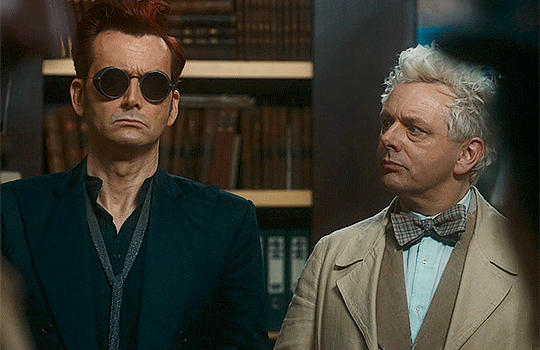
Would they have a bigger chance to be together in Hell than being on 'opposite sides' on Earth?
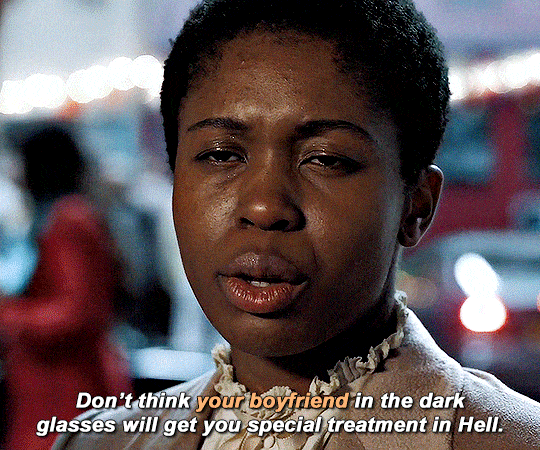
I doubt it. Even if Crowley earned some brownie points and maybe a dukedom for dragging an angel to Hell, how free would they actually be to be together? I bet that kind of behaviour would be frowned upon and deeply disliked by all other demons and we saw that many are happy to climb up however they can. Especially over others. Besides, Crowley never wanted power in Hell and definitely didn't want to spend time there if he didn't have to.
So, was Crowley simply considerate to Aziraphale's attachment to being an angel when he decided not to take him to Hell after Aziraphale lied to Gabriel about Job's kids? Did he not take him Down just cos the angel 'wouldn't like it'?
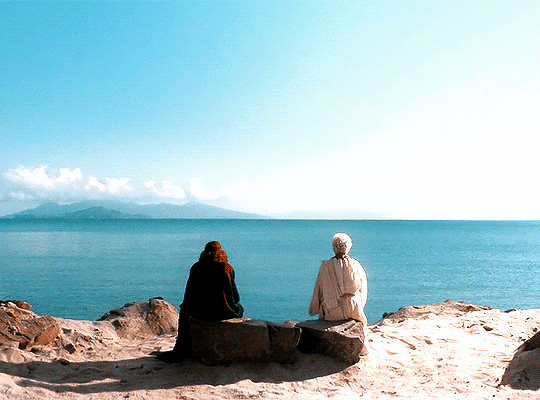
"No more world. Just endless Heaven or, depending who won, endless Hell. Crowley didn't know which was worse. Well, Hell was worse, of course, by definition."

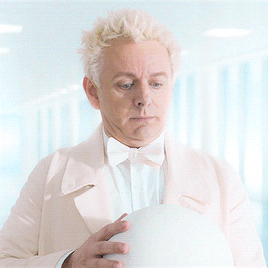
I feel like when I see people saying Crowley is respecting Aziraphale's desire to be an angel and avoiding/being scared of Falling; which (they assume/insinuate) would make it easier for them to be together, that they don't really respect Aziraphale's decision the same way as Crowley does (if it even is one), but blame Az for being selfish and choosing God and his angel status over his love for Crowley. Blame Aziraphale for being patronising, thinking he's better than Crowley, thinking he's too good to Fall. But also that Crowley shouldn't be in Hell and should be an angel again as his Falling was unfair. I see many takes that this is what Aziraphale thinks, but where do we see that? We only see Crowley musing on his Fall. We don't see Aziraphale, right?

We don't know why Crowley Fell.
We have only his vague words for it. Saying he didn't really mean to. We don't know if anyone Fell ever again after the War. It was very likely a threat used over the angels though. It didn't work for Gabriel. It must have been what he expected would happen. And that Beez would help him out. Other demons too scared of them to say anything. However, he was going to have his memory wiped instead. For basically a treason. Metatron, whether he suspected what was going on or not, outwitted him.
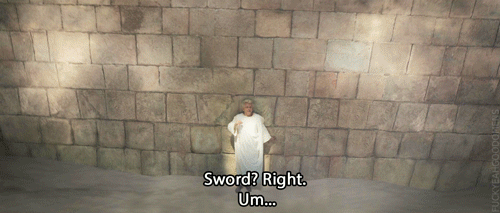
After Eden, Aziraphale MUST have expected punishment for giving away of his weapon. If not outright Falling.
How long did he spend in anxiety over this? Over what will happen to him?
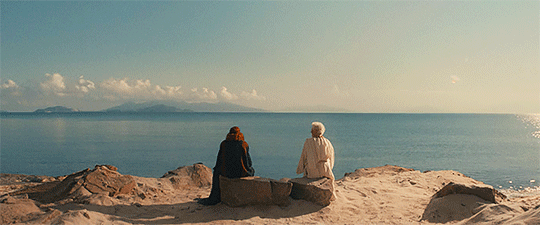
And how long did Aziraphale sit here, wondering what Hell would be like and when it will arrive for him? For lying and deceiving like that.
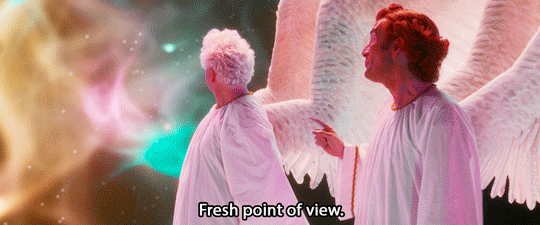
And ok he's worried about Hell but how BAD is Heaven exactly? Is Aziraphale blind to how bad it is? Is he staying with them because he's loyal? Because he believes they are the light? The truth?
How long has it been since Aziraphale knew Heaven was not Good?

Apparently since before Angel!Crowley knew.
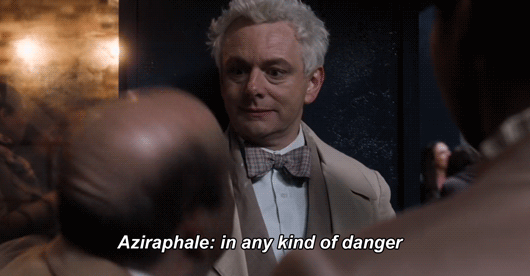
"You'll be amazed at the kind of things they can do to you, down there," he said. "I imagine they're very similar to the sort of things they can do to one up there," said Aziraphale. "Come off it. Your lot get ineffable mercy," said Crowley sourly. "Yes? Did you ever visit Gomorrah?" "Sure," said the demon. "There was this great little tavern where you could get these terrific fermented date-palm cocktails with nutmeg and crushed lemongrass-" "I meant afterwards." "Oh."

Crowley loves his beautiful, soft, good, brave angel.
An angel who lies to his bosses when he thinks he can get away with it, who indulges in 'gross matter' even if it's frowned upon.
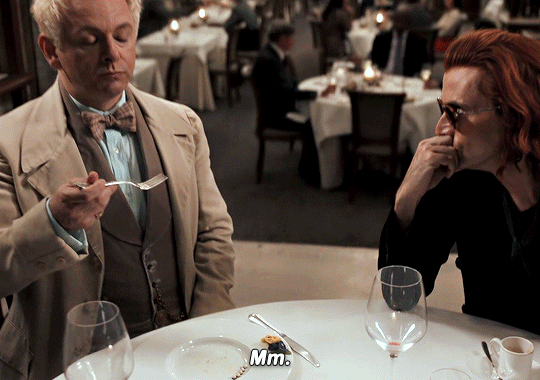
Crowley can't do good things openly. And we see him struggle with that.

Why would he want this for his angel who cares about strangers shooting each other in a game, saves babies in pushchairs and doves that accidentally asphyxiated in his sleeve, who waves away months of rent.
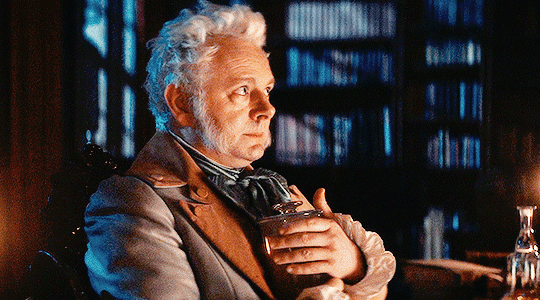
Yes, Heaven and Hell might both be awful places.
But that doesn't mean that good and bad things don't exist.

Nobody would call Muriel evil, right? Not even Jim was bad in S2. The nature vs nurture debate has a clear winner in his case. I don't know if Free Will has rubbed off on Az and Crowley or they were always different. Made different perhaps.
Although, without Free Will, how did Lucifer make his decisions against God?

Back to our Husbands.
Crowley hates Hell. He thinks it's an awful place and the demons are terrible. He's afraid of them and avoids them as much as he can.
Aziraphale is extremely uncomfortable in Heaven. He has disagreed with many things they do for literal aeons. Has warned Angel!Crowley immediately when they met and has trusted demon Crawley with his sword story as soon as he met him even thought he lies to literal God about the very same thing shortly after.
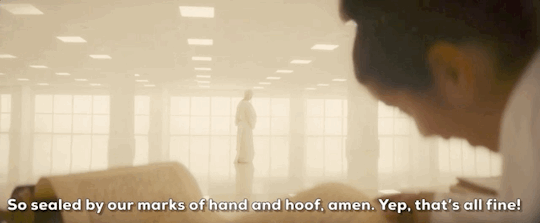
Aziraphale lies to the Supreme Archangel and a bunch of others over Job. He's questioned them on those decisions as well. He wonders if God is really asking for what they are saying She's asking. Clearly he didn't have a way to ask Her directly back then.
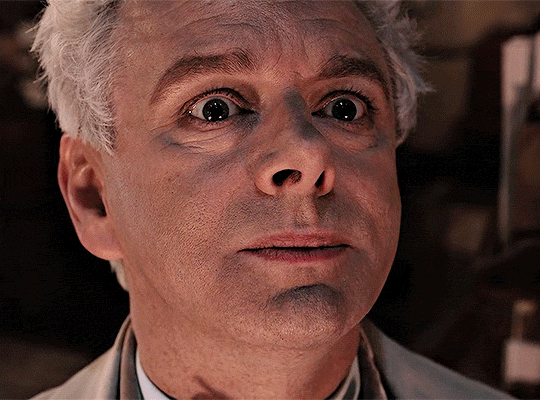
And he couldn't get through to Her when the world was ending either. And he felt that couldn't be right.

Aziraphale and Crowley are nobodies in their respective jobs.
Worse, they are pitied if not worse, for having jobs stationed on Earth.
Neither angels not demons care for humans, apart from them making up their numbers of acquisitions. But our hereditary enemies are more than that from the moment they meet in Eden. And their bond only grows stronger.

The bond that brings them so much joy and so much anxiety and fear.

They stopped the Armageddon but it didn't give them the freedom they wanted, the one they deserve. They spent more time together, yes.
But. Heaven, who after all came up with the idea of Hell, found a way to separate them.
How much of this was their personal decision and how much enforced, we won't find out until S3.
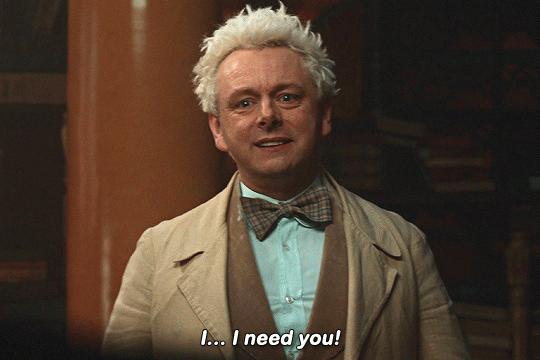
But Aziraphale didn't want Crowley to become an angel because he doesn't understand or see how bad Heaven is. He wanted him to come because he does.
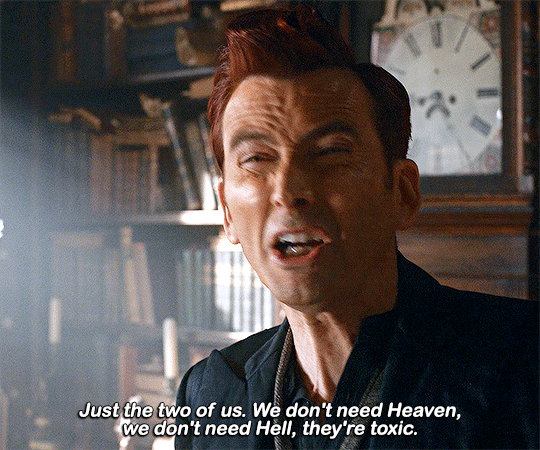
Yes. Of course. Aziraphale knows this. How could he not. But he also knows the boss of Heaven just told him he must return. Didn't seem like he was gonna take no for an answer. And Aziraphale tried.
Until Metatron brought Crowley into the conversation. Saying he knows about them. Their partnership. The thing Aziraphale feared more than anything else. Someone noticing just how deep their 'partnership' went.
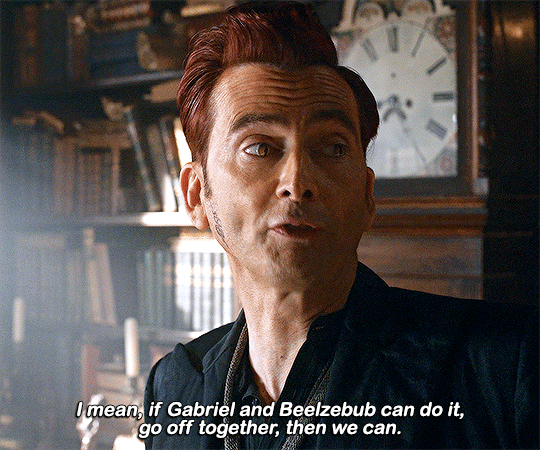
Crowley, I really don't think that would have worked. And I know you know it wouldn't either. Just as much as running to Alpha Centauri wouldn't. You know, and Aziraphale doesn't, that Second Coming is being planned. That this is why Gabriel was fired. And this you can't escape. There's nowhere to go.
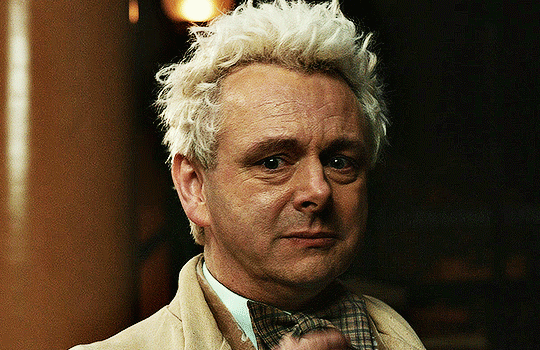
Their love is what makes Aziraphale and Crowley powerful. The love that no one, not even Gabriel and Beelzebub can understand. And it is this love that will save them in the end. What has always saved them.
Not Aziraphale's angelhood or Crowley's demon status.
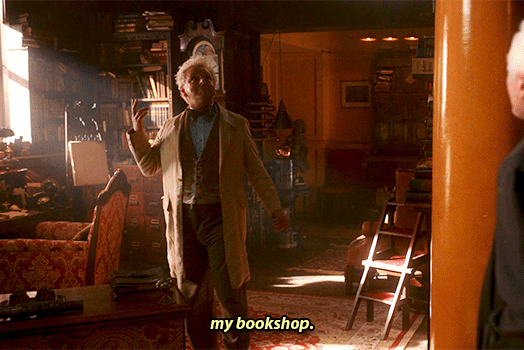
Aziraphale's home is the one he built for himself and Crowley.
It's not really a place though. It's a bookshop for a while, a moment in history, but his home is them, looking into each other's eyes forever.
Because no thing lasts forever. But they might. And they will.
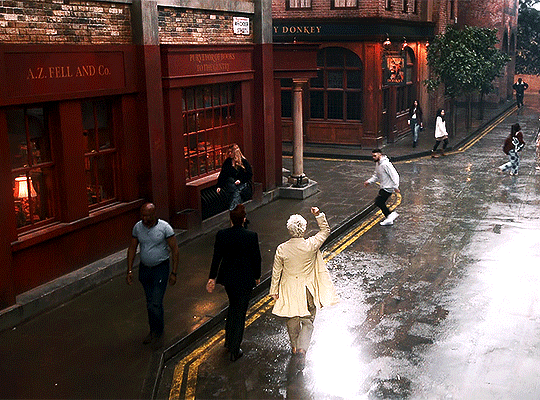
#good omens#aziraphale#crowley#ineffable husbands#aziracrow#good omens 2#aziraphale my beloved#good omens thoughts#heaven and hell#good omens heaven#good omens hell#good omens god#kaypost
196 notes
·
View notes
Text
Crowley was God's most dramatic creation.
She was also feeling particularly bitchy and gay that day, and thus, Aziraphale was made.
#anyways. God is a woman going through a hyperfixation and then burning out by the seventh day#good omens#ineffable husbands#good omens god#ineffable spouses#aziracrow#crowley x aziraphale#crowley#aziraphale#good omens s2#good omens season 2#gomens#good omens text post#good omens shitpost#feeling blasphemous today#and i'm tired of pretending these posts don't heal something in me#like. i'm reaching the point where God could be whoever I wanted her to be as a big /fuck you to religious trauma#it's nothing novel or special. just a fun thing to ponder#I'm a firm believer that in the gomens universe She created them as one btw#just as Neil and Terry created Crowley first#and then split their personalities into two#:)#marcela talks
484 notes
·
View notes
Text
It must have hurt Crowley so badly to watch God speak to Job and see him allowed to do the very thing that he Fell for. He typically shows no reverence for Her at all but in this scene you can see and hear some heartbreaking mixture of awe and incredulousness in his voice and expressions. I wonder if he felt envy in that moment or if he was angry. I wonder if he questioned what made Job so much more special than him.

#good omens#crowley#job#i only ever asked questions#good omens god#crawley#bildad the shuhite#a companion to owls
177 notes
·
View notes
Text
Can’t believe God showed us snippets of when Aziraphale and Crowley met as angels back in their s1 ep1 monologue…
Stars exploding s1

Stars exploding s2


Solar system s1

Solar system s2

#are these straws? yeah#and i’m still picking them up#i’m sure there’s more#God is aziracrow’s number 1 fan#good omens#good omens 2#aziraphale#crowley#aziracrow#ineffable husbands#ineffable spouses#aziraphale x crowley#good omens meta#good omens analysis#good omens parallels#good omens god
55 notes
·
View notes
Text
concept: good omens but instead of God narrating it, it's Cecil Palmer
293 notes
·
View notes
Text
God Is a Creepy-Ass Meta Mfer:
A Good Omens Essay
This essay features fan theory and speculation. DO NOT TAG NEIL GAIMAN IN ANY POST THAT INCLUDES OR REFERENCES THIS ONE.
The rest of this depends on accepting the premise that God's Plan is not always inscrutable in hindsight, i.e., that parts of that Plan can be discerned or identified as such once they have happened, even if the next moves of the Plan and its ultimate Purpose remain ineffable.
If you are willing to accept that premise, then I suggest we can conclude with reasonable certainty that Thesis Statement 1: Aziraphale's act of giving Adam the First Man the flaming sword is part of God's Plan, and so was Eve and Adam eating the Fruit.
The argument for the latter has been in circulation making even the beardiest of old Christian men scratch their heads for centuries, and in Good Omens, Crowley is the first being ever to make it:
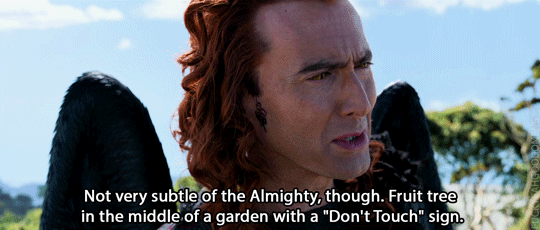
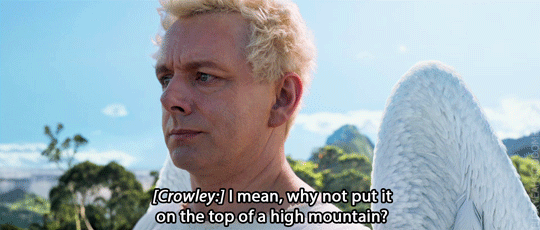
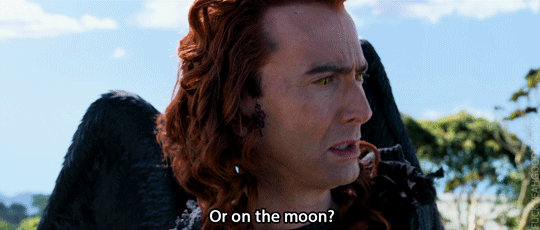
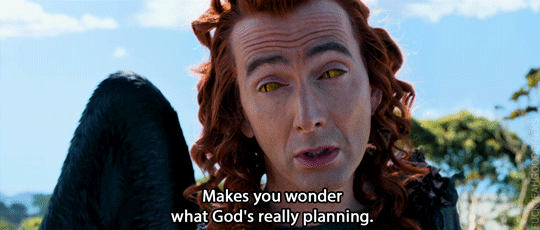
The presence of the Tree in the Garden placed by an omnipotent being with literally infinite orchard space and security technology is a clear indication that God intends humans to interact with the Tree and sets humans up in a divine entrapment operation, giving God the opportunity to curse humanity and evict them from the Garden.
Diversion onto Thesis Statement 2 bc the Essayist Got Distracted: This establishes both the Bible and Good Omens as works of literature in the cosmic horror genre (not that Good Omens doesn't do plenty of its own work in so establishing itself).
In both these stories God is a being beyond humanity's understanding, functionally omniscient and omnipotent, who first creates and then interferes with humanity for unknown reasons and who does not necessarily have humanity's best interests in mind at any point. His/er reasoning and objectives for humanity are opaque, and S/he manipulates circumstances to create excuses to do humanity as a species and sometimes specific humans harm.
If you're not already familiar, go read all the shit God curses humans with when Eve and Adam snack on the Tree's Fruit. It's frighteningly cruel, if not outright psychopathic. So is God's behavior the Book of Job, His demand that Abraham sacrifice Isaac, Mosaic Law, and the sacrifice of His/er Son. Human lives are no more significant to God than the lives of ants are to humans. This whole history of Earth? It may not even be about us. Our entire species' history may just be part of the backdrop to something else, like two angels falling in love and reuniting Heaven and Hell, or like raccoons. It could all be about the raccoons. Who knows! All of this is absolutely 100% pure undiluted cosmic horror.
Right, okay, so back to Thesis 1: In Good Omens, Aziraphale's gift to the first man of the flaming sword is an objective God wants. Here's my chain of reasoning:
The Eating of the Fruit and God's punishment were both objectives of God. See above.
2. Once those objectives had been accomplished, humankind would not have survived outside the Garden of Eden without the sword. They literally would not exist at all.


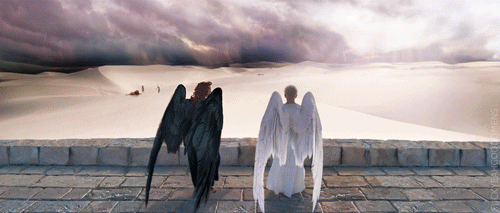
Adam the First has to kill the lion, either to keep it from killing him and Eve or to keep him and Eve from starving. No flaming sword = no humanity.
3. We know "no humanity" is not God's Plan, because--
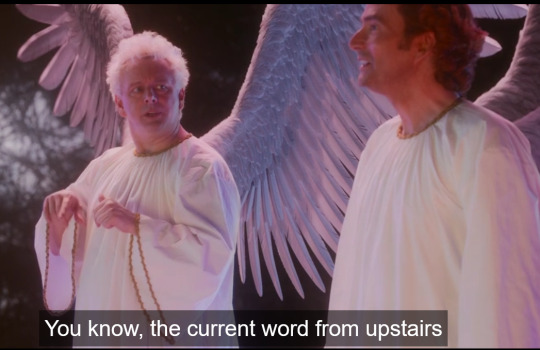
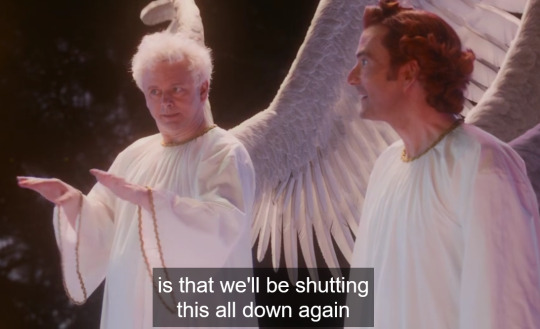
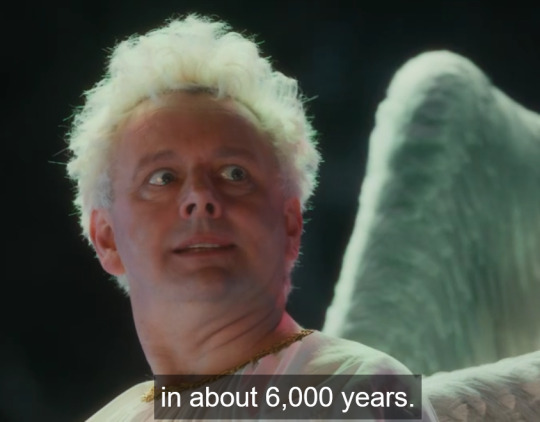
--God says her Plan is Armageddon and the Second Coming in 6,000 years. So humanity needs to exist for either of those to occur (or for there to be any reason for adventures about averting them to occur). And God does a whole Crucifixion and Resurrection of His/er Son. So God wants humanity around and is even prepared to welcome them back into His/er grace, providing they meet certain conditions.
4. We know God is not displeased about Aziraphale's gift of the sword to humans because God asks Aziraphale about the sword, and Aziraphale lies and says he's lost it, and God, who is omniscient and therefore knows this to be a lie and knows exactly where the sword is, lets the entire thing pass unremarked. (More on this anon.)
5. It is not a reach too far to suspect this of God. She tells us Herself that she is a trickster and that we can't trust her not to deceive us:
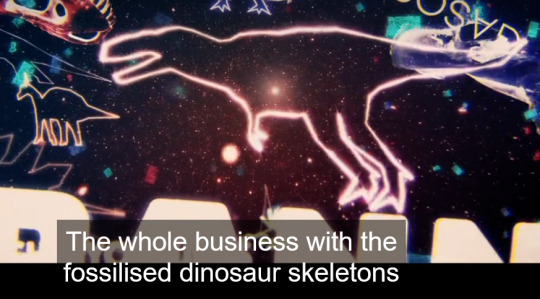

She also tells us
i. The universe is a game she is playing for her own amusement:
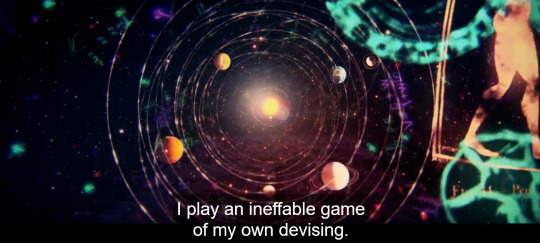
🎵cosmic horror alerrrrrrrrrt!🎵🎶
ii. No one, including angels and demons, has been told the real rules of this game:

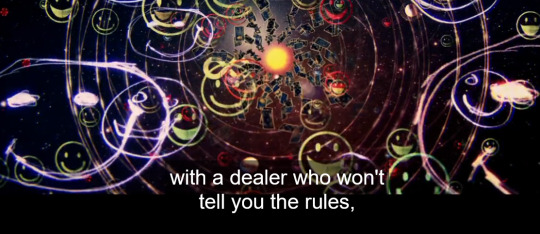
"FOR EVERYONE ELSE." Not just humans.
That's why Crowley and Aziraphale each have to wonder if they've done the right or the wrong thing: nobody's told them what the rules are. Aziraphale even thinks that Crowley's temptation of Eve is "all part of the Plan," i.e, that Crowley did the right thing by doing the wrong one. They have no way to tell, and it may be both right and wrong at the same time. (Wrestling with impossible moral conundra raised by a brief look into a story happening on a much greater level than your own? You could be suffering from our old pal Thesis 2: Good Omens is cosmic horror!)
So Aziraphale's Promethean gift to humanity was one of God's objectives, just as cursing humans and yeeting them out of the Garden with the knowledge of Good and Evil and maybe a couple apple seeds in hand was His/er objective.
BONUS! Thesis 3: So why does God bring up Aziraphale's misappropriation of the sword at all? To show us, the audience, that Aziraphale lied to Her and that his gifting of the sword to Adam is part of Her Plan.
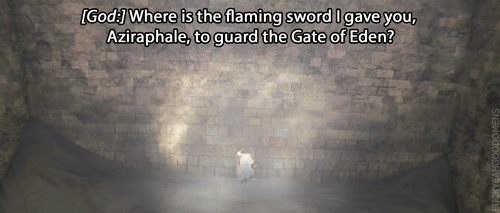
Remember from her whole deal with the Tree: God likes to set up situations so that She can react to them. Here she lampshades her awareness of what Aziraphale has done, listens to him lie to Her about it, and then very pointedly does nothing in response to that. She wants everyone watching--i.e., Aziraphale and us--to note that she has noticed the transfer of the sword and is not displeased by it and has noticed the lie and is not going to do anything about that either.
Remember as well, God is the one controlling the narrative we see in S1 of Good Omens. She introduces and concludes the story, and she narrates the scenes of the baby-swap. She's in control of which scenes we see and the order in which we see them. Since she is the one who asked Aziraphale the question about the sword, she's also responsible for this scene's existence.
So why do I think this scene is meant for us and not Aziraphale? Two reasons. Firstly, the conversation with God doesn't do Aziraphale any good. He worries about eventually getting in trouble about the sword until 2019, around 6,000 years later.
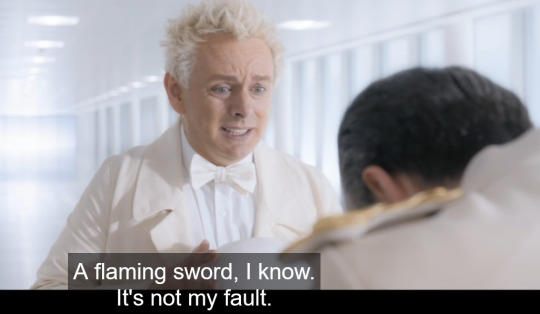
God is both omniscient and omnipotent, so it's not possible that She failed to communicate to Aziraphale in such a way that would ease his anxiety. Therefore the conversation was not for his benefit. Again, she's omniscient, so it wasn't for Her benefit either. That leaves the only other party to this conversation: us. The audience.

The next obvious question is, Why does God want us to know that Aziraphale's gift of the flaming sword was both of his free will and part of Her Plan?
I don't know. But I think it may become important, and here is where we delve into hypothesis territory: I think Good Omens is going metafictional. I mean this in a Doki Doki Literature Club, Black Mirror: Bandersnatch way: God, the character in Good Omens, is telling us, the audience, a story.
This metafictional aspect has been with us the whole time---more precisely since 01:13 of S1E1, when God switches from third-person to first-person and addresses us the viewers directly:

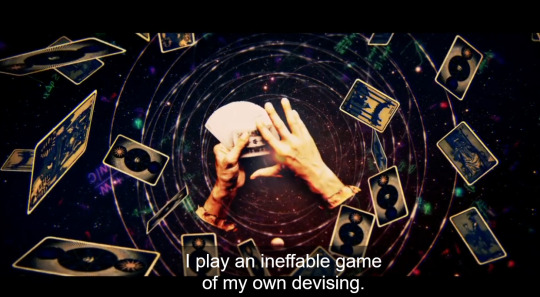
And there are several more metafictional; notes in S1 and S2 that I've found so far:
Season 1
That giant eyeball up there floating in space with a bunch of arcane shit around it is a reference to the opening credits sequence of The Twilight Zone, a metafictional show in which an omniscient narrator introduces and concludes each story by addressing the audience directly.
S1E1 27:20
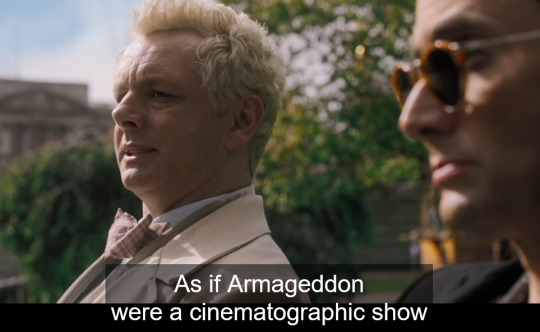
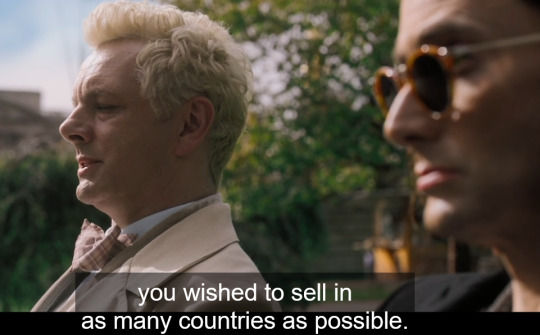
Season 2
1. Maggie and Nina are fictional characters, but the characters share their names with actors Maggie Service and Nina Sosanya.
2. The final credits sequence, with the split screen showing Crowley on one side and Aziraphale on the other, references David Tennant and Michael Sheen's previous/simultaneous lockdown tv series project, Staged! which is intensely metafictional and in which Tennant and Sheen play characters based on themselves and with their names.
3. Sloppy plot synopsis or something more sinister?
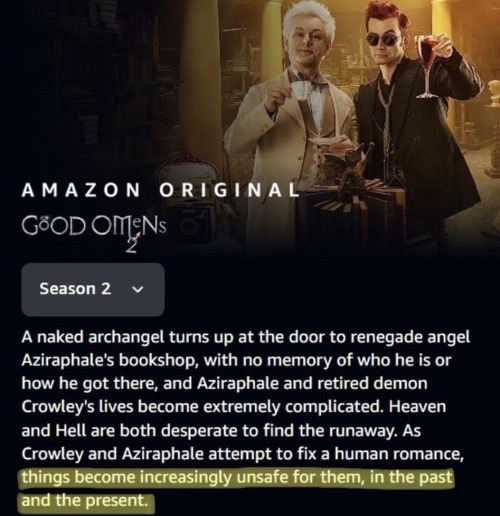
4. An interviewer points out that Good Omens references Doctor Who as an extant concern in-universe, which obviously stars David Tennant in the past and currently.
If you find more, please drop them in the comments!
We the audience, are meant to understand ourselves and our reality as being indirectly involved in this story. And God wants us to know 1) that Aziraphale lied to Her about giving away the sword, knowing it was futile, and 2) that his gift of the flaming sword was part of Her Plan. The former is a major character note, and probably a foreshadowing one; but I have no guesses about God's purpose in showing us that the gift of the flaming sword was also to Plan except that whatever it is will probably make me dislike Her approach to parenting even more than I already do.
What I do love about this though is that it suggests that Crowley and Aziraphale both did the right thing by doing the wrong one, i.e. achieved a kind of Schroedinger's obedience, which is nice and disturbing and surprise! pretty cosmic horror. More sweetly, though, it suggests that the two foundational gifts to humanity from the divine were motivated by Crowley's low-effort mischief and Aziraphale's kindheartedness, which is lovely to think about.
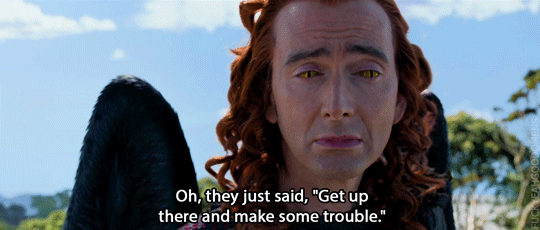
DO NOT TAG NEIL GAIMAN IN ANY POST THAT INCLUDES OR REFERENCES THIS ESSAY.
#good omens#good omens s2#good omens god#good omens metafiction#good omens cosmic horror#good omens flaming sword
189 notes
·
View notes
Text
GOOD OMENS 2, THEORY #5.
Ms. Cheng is God.
No comments.
#go2 spoilers#go2 theory#aziraphale#neil gaiman#good omens 2#david tennant#ineffable husbands#good omens#terry pratchett#crowley#goodomens#buenospresagios#good omens god#ms cheng good omens
178 notes
·
View notes
Text
Aziraphale gets trolled by God XD
#good omens#aziraphale#crowley#aziracrow#angel crowley#ineffable husbands#good omens god#horror#analog horror#you cant hide#funny#trolling#trololol#pwned#pavoromnia
55 notes
·
View notes
Text

Victim to the sands of time

#good omens#good omens art#good omens fanart#good omens god#hourglass#hourglass art#fanart#my art#digital art#art
20 notes
·
View notes
Text
Aziraphale is legitimately a fascinating character to me, especially considering how the narrative deals with his fear specifically.
Think about it. Six THOUSAND years. That is an UNFATHOMABLY long time. We cannot even begin to conceive of it as humans. And he has been looking over his shoulder (as has Crowley), because at any moment someone could walk up to him, decide he isn’t good enough, and permanently take him away from his home. This goes as I said for both, because they can’t get new bodies on their own. If they’re taken out, living as they were becomes pretty much impossible, which is horrifying.
But Aziraphale specifically I find really interesting because of his situation. Consider this. You are presented with your creator. The person who designed you down to your very molecules, and they tell you the meaning of life. And they tell you you were created to be good. And you watch as all these people, created same as you, fail, and are taken and burned and warped into monsters and you are told they are evil.
And then you meet one of them. And he is kind, and he helps, even better then Heaven can, sometimes. And that is terrifying, because you are told he is evil. So either they, those that created you and everything you have always been meant to do, are wrong, or you cannot yet see how evil he is. And both terrify you. So you spend years waiting for the trap to spring, and it never does, and that can’t be right because he is no longer supposed to be good, he is fallen, and none of that makes any SENSE.
Throughout Good Omens, we see even how Crowley identifies with the role Hell has assigned him (“I’m not NICE.”) but Aziraphale is in a totally different position. Because Crowley has already fallen, he can avoid Hell. And Hell, like Aziraphale learns Heaven is, is fallible. But unlike Crowley, Aziraphale is still an Angel. Aziraphale can still Fall.
And no matter how fallible Heaven is, God is all knowing. He has to live with the fact that God is watching, all the time, and judging his actions. And if She sees them, and decides he has indulged too much, that his love of a demon is wrong, that he is no longer good, he will Fall. And he has spent thousands of years shaping his identity around the word “Angel”. If he falls, he will no longer get to be nice, and kind, and himself, and he is terrified.
Aziraphale is so black and white about things because he is so terrified of what grey means. Because if grey exists the way he thinks it might, then his whole existence for thousands of years might have been wrong. And that is fascinating to me.
#good omens#good omens season 2#go#go2#good omens aziraphale#good omens crowley#crowley good omens#aziraphale#aziraphale good omens#anthony j crowley#good omens heaven#good omens god#too many thoughts about this angel#this man has on and off and no other settings factory got stuck
71 notes
·
View notes
Text
Of Poker, Blank Cards, and Smiling Dealers
Let's talk God's Game for a minute.
God is playing complex poker in a dark room with blank cards and a Dealer who keeps smiling. But let's be real. It's God. Is She playing or is She actually the Dealer? I think it's both.
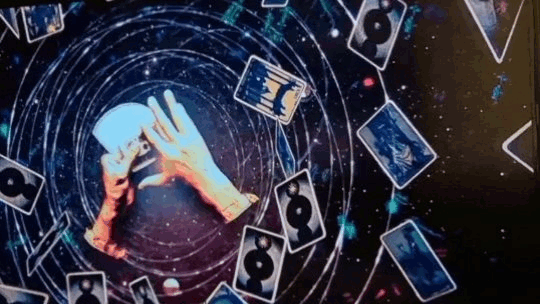
God's true purpose is the Dealer, shuffling the cards, handing out winning and losing hands. That's right up God's alley.
But, She's also playing for humanity because who else could? Humans are Hers, after all.
And this is where it gets interesting. Because, there are other Players. But who are they? My guess:
1. Heaven (Player: The Metatron)
2. Hell (Player: Satan)
3. Humanity (Player: God)
And God is playing AND dealing. And the Dealer has to deal, has to give a playable hand, otherwise there's no game. It doesn't have to be the winning hand, but each player needs cards regardless. But, God created the cards, and She knows every card that is going to be drawn into each Player's hand.
My theory is God's Stacking the Deck in favor of humanity, in favor of her little pet project that She's created to keep Herself entertained.
Now, let's talk the Blank Cards.
The cards themselves are every other being in this Ineffable game. Each angel, demon, and human is a card in Heaven's, Hell's, or Humanity's hand. The Four Horsemen? Hell's. Michael? Probably Heaven's from what we've seen so far. Anathema Device? Humanity, definitely. Saraqael? Muriel? I don't think we've seen, but I've got some ideas.
But, why blank? Well, how else do we account for free will? The cards are blank because that's the fun part of the game. The complex part. Just because you've got the card, doesn't mean you know how it will be played, what choices it will make. What other cards it will come into contact with.
Except, if you created the cards, then maybe you have an edge. A tiny edge over the other players. Just enough to stack the deck in your favor.
And this is where Crowley & Aziraphale come in. They're Her trump cards (if you'll allow me to mix card game metaphors for a minute - it is, after all, complex poker).
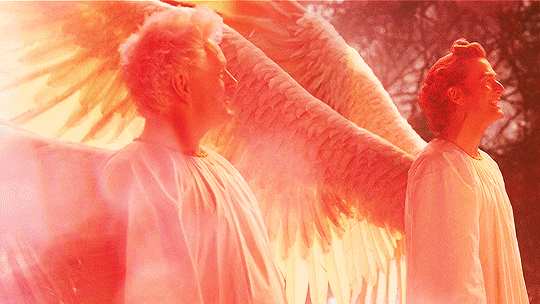
She created them. She knows them. She can't control them, but She can make predictions about what they will do. And She knows that they are a group of the two of them, that if She puts them together on that tiny little planet, they will do everything they can to protect it together, because that's how She created them.
So yes, they get to make their own choices. Crowley can help save a gravedigger's life and get taken off the table by Hell for a bit because of it. Aziraphale can choose to go back to Heaven as Supreme Archangel and get removed from the table by Heaven for now
But, when push comes to shove, both of those cards are squarely in Humanity's hand, just as God dealt. They are there together. And once they both come back onto the table, Humanity can't do anything other than come out on top.
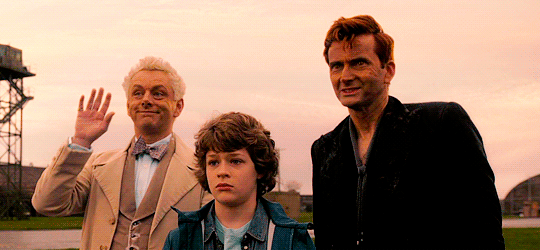
And if my hand had those two, I'd be smiling, too.
#good omens#good omens meta#goodomensmeta#good omens god#good omens poker#go god#aziraphale#crowley#crowley x aziraphale#aziraphale x crowley#aziracrow#ineffable husbands#ineffable spouses#go crowley#go aziraphale#stack the deck#God's Game
78 notes
·
View notes
Text
About the "Before the Beginning" scene
There is one part of Aziraphale's and Crowley's conversation in the "Before the Beginning" scene that I found particularly interesting, because it reminded me of some real-life conversations that I have seen happening in religious contexts.
There are some religious people who keep talking about how wonderful God's creation is, yet they don't show any real concern for it. They don't protect the environment, they don't care about making sure that everyone is granted their human rights.
That is because they view creation only as a proof of how great God is. Much like Aziraphale in "Before the Beginning", when he expresses the belief that all the stars and the nebula "exist just so that the people can look up into the night sky and marvel at the illimital vastness of the Allmighty's creation".
Crowley, on the other hand, thinks that creation has a value in and for itself, and therefore deserves respect: "It's the universe, not just some fancy wallpaper! Millions of galaxies, trillions of stars, oodles of everything, it's not just put here to twinkle!"

That is why he is so opposed to the idea of Armageddon. He believes that no one should be allowed to damage all these things, not even God him-/herself. The ability to create life does not give you the right to destroy it.
This thought can be extended even further. There are people who claim that certain things (e.g. homosexuality) are unwanted by God. And those who feel different are told that they must deny who they are and bend to God's will, because they are his creatures.
But, for those who believe in God: Does the fact that God created us give him the right to make even the most personal decisions for us? Or should we be able to choose for ourselves how we want to live our lifes?
#good omens#good omens before the beginning#good omens god#good omens meta#religion#31daysofgoodomens
15 notes
·
View notes
Text
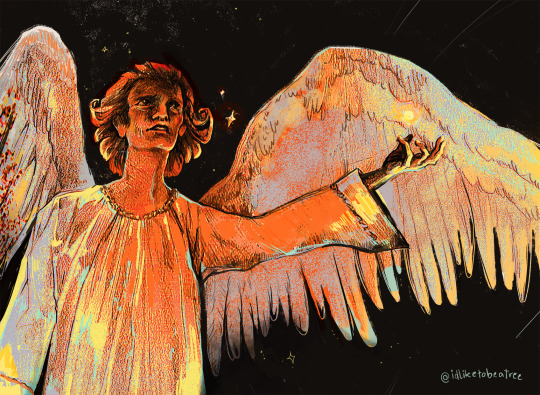
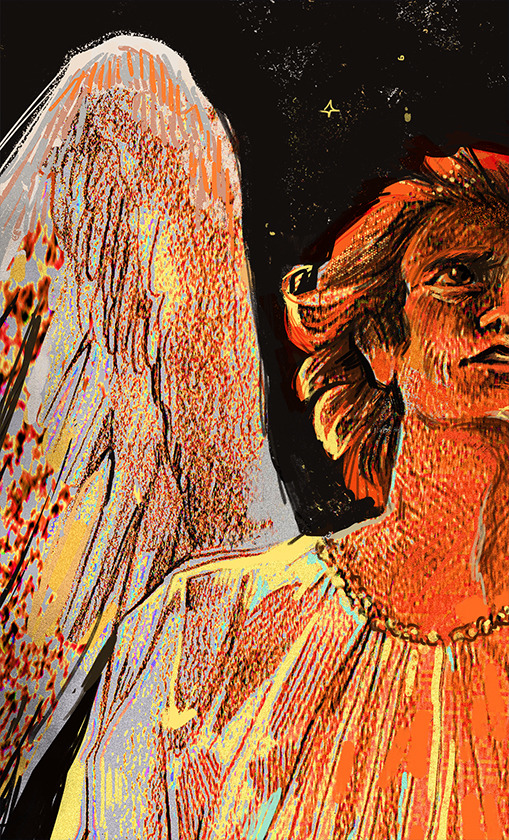

What’s the point in creating an infinite universe with trillions of star systems if you’re only gonna let it run for a few thousand years? (...) Look, someone's gotta tell the Boss, this is a really terrible, terrible idea.
I was thinking of the Starmaker ((as you do)), and I realised this really is a defining moment for shaping Crowley's character, even pre-Fall. Probably the first time she has ever experienced such a range of emotions. Dissapointment, sadness, confusion, feeling like her purpose is, ultimately, meaningless, perhaps a smidge of anger. A desire to bargain, like she could somehow persuade God to change Her mind. And at the root of it - loosing her faith, or the belief that God is the source of all goodness, essentialy developing a moral code. I wanted to portray that moment of personal upheaval, what would be a brilliant mind trying to protect what she's worked hard on, but not yet aware of the consequences, because, well, what is the worst that God could do to Her celestial children? She made them Herself.
...on second thought, maybe that should have clued Crowley in.
#good omens#good omens fanart#starmaker crowley#crowley#anthony j crowley#angel crowley#good omens 2#in the beginning#good omens god#good omens art#ineffable husbands#david tennant#neil gaiman#my art#marcela talks
286 notes
·
View notes
Text
You Forgot Your Brakes - Chapter One
He let out a breath he didn’t know he’d been holding and rubbed the forming tears from his eyes. In a way, being there, surrounded by memories, made it all feel better. It made him feel as if Aziraphale would appear in the door, simply returning from a lengthy escapade. Could living within that fantasy really be that wrong ? He let out a laugh at the wording of his own thoughts.
Lord help me I have paid money for chapter organizers and now this fic has it's plot on paper. Precedents are being broken my friends.
#good omens#aziraphale#crowley#aziracrow#niel gaiman#good omens fanfiction#good omens fanfic rec#good omens 2#anthony j crowley#ineffable husbands#good omens god#god bless this bike#i mean fanfiction#close enough
20 notes
·
View notes